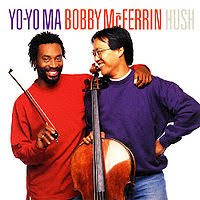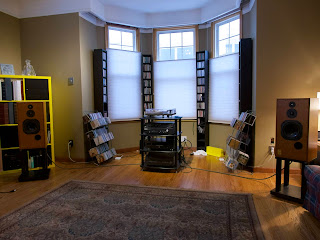The Human Voice -- Tones & Overtones
Is it our experience in the womb that helps us to respond positively to deep sounds? What makes every human voice different is a recipe of frequencies being broadcast at the same time. Sometimes we talk about the timbre of someone's voice, or we might notice that some people speak or sing from somewhere deep inside themselves while others' voices project from their nasal passages. The human body has many resonance chambers that impart personality to our voices.
If you look at the arrangement of instruments in music, almost any form of music at all, tones and overtones are layered upon one another. In a developed form of music like that for the pipe organ, the pedal notes provide a base or a kind of tidal rhythm that gives depth and momentum to the melody, harmony and counterpoint being played.
 In a rock band, the typical orchestration is an electric guitar, an electric bass guitar and drums. This basic arrangement is derived from jazz and blues: a lead instrument in the range of the human voice, an instrument in a lower register to provide a drone and a rhythm instrument to punctuate the music. Added to these instruments could be reinforcement in any of these areas. A keyboard could be used to supplement all three.
In a rock band, the typical orchestration is an electric guitar, an electric bass guitar and drums. This basic arrangement is derived from jazz and blues: a lead instrument in the range of the human voice, an instrument in a lower register to provide a drone and a rhythm instrument to punctuate the music. Added to these instruments could be reinforcement in any of these areas. A keyboard could be used to supplement all three.
The bagpipes do the same. There is a chanter that does the speaking part, the drones that provide the bass, and the physical technique of the player who punctuates the notes by the way he or she breathes and manipulates the fingers.
It is with the human voice, however, that we can find an instrument that needs no supplement. Every element of orchestration is to be found there. To illustrate this point dramatically all you need to do is look at singers from the jazz tradition who do what is called "scat". Probably the best example right now is Bobby McFerrin. Bobby McFerrin & Yo-Yo Ma -- Mockingbird
Some people find it hard to understand what the attraction of opera is. Why would someone listen to singing the word's of which are even hard to understand when you know the language being used? A big part of the answer is the marvel of the human voice.
You may remember or know of the popularity of the three tenors, Luciano Pavarotti, Placido Domingo and Jose Carreras. Each was a "divo" an opera mega-star. When they sang together at the World Cup in Rome with the ancient Baths of Caracalla as a backdrop they took the rather specialized world of the opera singer and became a popular phenomenon -- for the very same reasons. The human voice is a marvel.
Pavarotti, who has since died, was not the best performer sometimes, and he was not a great actor on the stages of opera, but he had a magnificent and apparently effortless natural ability. Domingo, in his career, has been more of a complete package. His voice in its heyday had wonderful timbre and resonance. He acted well and he has been a public person of grace and dignity. Carreras, whose voice has been noticeably finer and less powerful than the other two accounts for a somewhat different opera repertoire that also has remained popular.
Canadians have nothing to be shy about. Richard Margison, Ben Heppner, Russell Braun, and Michael Schade have achieved international acclaim. Among women, Suzie LeBlanc, Isabel Bayrakdarian, Karina Gauvin, and Sondra Radvanovsky.
In popular music you can easily think of arresting voices who might not be very technically attractive but that have depth and texture. Johnny Cash certainly comes to mind. And then there are extraordinary voices in the popular music realm too. Roy Orbison was such a voice for me.
Jazz is full of great voices. My own bias is toward Ella Fitzgerald. I don't think she could sing a bad note. Maybe it would more true to say that even a bad note from Ella was way better than a good note from almost anybody else.
There is no greater instrument than the human voice. It touches profoundly. Choose well and listen with care. The depth and texture of life and love is there.
If you look at the arrangement of instruments in music, almost any form of music at all, tones and overtones are layered upon one another. In a developed form of music like that for the pipe organ, the pedal notes provide a base or a kind of tidal rhythm that gives depth and momentum to the melody, harmony and counterpoint being played.
 In a rock band, the typical orchestration is an electric guitar, an electric bass guitar and drums. This basic arrangement is derived from jazz and blues: a lead instrument in the range of the human voice, an instrument in a lower register to provide a drone and a rhythm instrument to punctuate the music. Added to these instruments could be reinforcement in any of these areas. A keyboard could be used to supplement all three.
In a rock band, the typical orchestration is an electric guitar, an electric bass guitar and drums. This basic arrangement is derived from jazz and blues: a lead instrument in the range of the human voice, an instrument in a lower register to provide a drone and a rhythm instrument to punctuate the music. Added to these instruments could be reinforcement in any of these areas. A keyboard could be used to supplement all three.The bagpipes do the same. There is a chanter that does the speaking part, the drones that provide the bass, and the physical technique of the player who punctuates the notes by the way he or she breathes and manipulates the fingers.
It is with the human voice, however, that we can find an instrument that needs no supplement. Every element of orchestration is to be found there. To illustrate this point dramatically all you need to do is look at singers from the jazz tradition who do what is called "scat". Probably the best example right now is Bobby McFerrin. Bobby McFerrin & Yo-Yo Ma -- Mockingbird
Some people find it hard to understand what the attraction of opera is. Why would someone listen to singing the word's of which are even hard to understand when you know the language being used? A big part of the answer is the marvel of the human voice.
You may remember or know of the popularity of the three tenors, Luciano Pavarotti, Placido Domingo and Jose Carreras. Each was a "divo" an opera mega-star. When they sang together at the World Cup in Rome with the ancient Baths of Caracalla as a backdrop they took the rather specialized world of the opera singer and became a popular phenomenon -- for the very same reasons. The human voice is a marvel.
Pavarotti, who has since died, was not the best performer sometimes, and he was not a great actor on the stages of opera, but he had a magnificent and apparently effortless natural ability. Domingo, in his career, has been more of a complete package. His voice in its heyday had wonderful timbre and resonance. He acted well and he has been a public person of grace and dignity. Carreras, whose voice has been noticeably finer and less powerful than the other two accounts for a somewhat different opera repertoire that also has remained popular.
Canadians have nothing to be shy about. Richard Margison, Ben Heppner, Russell Braun, and Michael Schade have achieved international acclaim. Among women, Suzie LeBlanc, Isabel Bayrakdarian, Karina Gauvin, and Sondra Radvanovsky.
In popular music you can easily think of arresting voices who might not be very technically attractive but that have depth and texture. Johnny Cash certainly comes to mind. And then there are extraordinary voices in the popular music realm too. Roy Orbison was such a voice for me.
Jazz is full of great voices. My own bias is toward Ella Fitzgerald. I don't think she could sing a bad note. Maybe it would more true to say that even a bad note from Ella was way better than a good note from almost anybody else.
There is no greater instrument than the human voice. It touches profoundly. Choose well and listen with care. The depth and texture of life and love is there.

